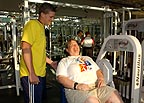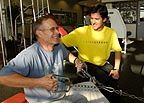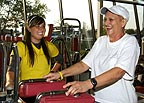October 16, 2007
Program improves cancer patients' quality of life

Caption follows story
"It's not a cookie-cutter routine — it's based on what their capabilities are at the time," said Anton, an exercise physiologist in Southern Illinois University Carbondale's Department of Kinesiology. Anton directs the Strong Survivors exercise program, sponsored by Southern Illinois Healthcare, which is meeting twice a week at John A. Logan Community College's Community Health Education Complex in nearby Carterville.
"(Participants) are encouraged to work at their own pace," he said.
"If there's an exercise they're not comfortable doing, we figure out something else. We encourage them to try, but we don't stand there with a cattle prod. They've been through enough. They don't need us making them any more uncomfortable than they are."
Anton, whose doctoral work at the University of Northern Colorado focused on exercise as therapy to counteract the physical effects of cancer treatment, feels a strong bond with those who have the disease. His cousin — his best friend — began her losing battle with cancer at 14. It took her leg, her lungs, her brain and, at last, her life.
For a while, her death left him drifting. Then his dissertation adviser founded the Rocky Mountain Cancer Rehabilitation Institute and invited him to work there. He realized shortly after that he'd found his calling.
"It allowed me to do research and be a human being at the same time — to interact with people," Anton said.
"You can't find a more rewarding subject population than cancer patients. When they're told they have cancer, their life often spins out of control. Where a program like (the Strong Survivors) comes into play is that we give patients a toehold, an opportunity to have some sort of control. They can make themselves stronger, decrease the amount of fatigue they feel and increase their overall quality of life — it's so rewarding.
"It can be tough, because eventually you will lose people to the disease, but that's a 'con' that's outweighed by so many 'pros' that are too numerous to count. I am amazed by what these people have gone through, the things they're willing to try and the lengths they're willing to go to try to get their lives back. They are the most resilient people you will ever meet."
Organizers at Southern Illinois Healthcare originally designed Strong Survivors as a nutrition education program with a little walking on the side. They'd already applied to the Lance Armstrong Foundation for a grant when Anton came along. He told them he could design an exercise program that would accomplish far more for the participants than walking alone would do. Then some folks from John A. (as the college is known locally) said they could arrange free use of their exercise equipment, and when the grant money came through in September 2005, the revamped program took off. It's been going strong ever since.
Participants meet twice each week for 12 weeks. At the beginning, they learn the basics of nutrition and physical activity as these apply to folks with cancer. They undergo tests to assess their ability to perform tasks associated with daily living — going up and down stairs, carrying things and the like — and they fill out questionnaires about how active they are, how easily they tire and their overall quality of life. They also detail their cancer and medical histories.
"Different cancers require different treatments and different grades of treatment," Anton said.
"With breast cancer, for example, many of the surgical procedures mean they have limited ability to use one arm or sometimes both.
"All this information helps us write their 'exercise prescriptions.' We give them a few weeks to get comfortable — a lot of them have never been in a gym before — and then we adjust the intensity. Periodically throughout the class we also adjust the exercise they're doing so they're not doing the same thing over and over."
Even after just a few weeks in this fall's session, Carbondale resident Kenneth J. Emmons said being part of the class has made a difference in his life.
"I've been conscious since I've been in the class about doing some walking — it's almost killed me!" he said, laughing.
"It gets us old moldy seniors off the couch and lets us move a little. It inspired me to try to take care of myself again."
Joyce Ambler of Carterville, a breast cancer survivor, signed up with her husband of more than 30 years, David, who has never had cancer.
"If you were to tell my kids their mom is 'going to the gym' and 'enjoying exercise,' they'd most likely look at you in disbelief," Ambler said.
"Phil and his young (undergraduate research) assistants through their kind and gentle guidance have taught me so much. I feel more energetic after exercising and truly enjoy it. And having this class gives David and me the satisfaction of knowing we are doing all we can to prevent a recurrence of cancer."
Anton, who hopes to broaden his research to include caregivers as well as survivors, said he was glad to welcome them.
"Cancer is tough on the person who has it but almost tougher on those in a support position," he noted.
"They often feel helpless, don't know what to say or do."
This term's Strong Survivors program will end Nov. 15. When it's over, Anton will re-assess the participants to gauge their progress. Based on experience, he expects good results.
"We have seen improvement in at least one of the test areas in every single person since we started — in the majority of cases, we see improvement in all the test areas," he said. "We also see an improvement in mood and attitude, though that's not something we measure.
"For me, the numbers are great because they help me in the research arena, but I am more about what I see on their faces and what they tell me about how they're feeling. That's much more valuable to me than any piece of research data will ever be."
The next Strong Survivors program will take place in January. For more information, call Anton at 618/453-3131 or e-mail him at panton@siu.edu.

Caption follows story

Caption follows story
A helping hand — Brian M. Thoele, a senior in exercise science and dietetics at Southern Illinois University Carbondale, assists cancer survivor Sandra L. Shea of Carbondale with a workout designed specifically for her. Thoele, an undergraduate research assistant, works with SIUC exercise physiologist Philip M. Anton on a project aimed at using exercise to ease the effects of cancer treatment and its aftermath. Thoele is the son of Teutopolis residents Joan Buehnerkemper, 15773 E. 1420th Ave., and Kurt Thoele.
Strong support — David Ambler (left) of Carterville works some muscles he didn't know he had under the watchful eye of Philip M. Anton, an exercise physiologist at Southern Illinois University Carbondale. As part of his research dealing with the ability of exercise to ease the effects of cancer treatment and its aftermath, Anton tailors workout regimens to individual survivors and assesses the results in a program called Strong Survivors. Ambler, who doesn't have cancer, enrolled to be with his wife, Joyce, who did.
Living strong — Angela D. Cress (left), a senior in exercise science at Southern Illinois University Carbondale, assists cancer survivor Kathryn L. Lockwood of Herrin with a workout designed specifically for her. Cress, an undergraduate research assistant, works with SIUC exercise physiologist Philip M. Anton on a project aimed at using exercise to ease the effects of cancer treatment and its aftermath. She is the daughter of Verona residents Russell and Diane Cress (4310 W. Grand Ridge Road).
